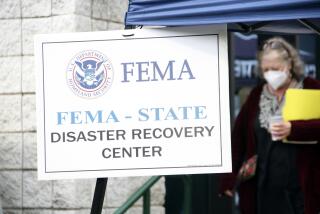Putin suggests U.S. may have provoked Georgia conflict
UNITED NATIONS — The United States and Russia on Thursday traded some of their sharpest words over the conflict in Georgia, including a suggestion by Russian Prime Minister Vladimir Putin that Washington provoked the fighting to sway the outcome of the U.S. presidential race.
The Cold War-style barbs, hurled at long range from the two capitals and face to face at the United Nations, underscored the breakdown of diplomatic efforts to end Russia’s 3-week-old military intervention in the former Soviet republic.
Russia faced international isolation two days after it recognized the independence of a pair of breakaway Georgian regions at the center of the conflict. It won no support for the move at meetings of the U.N. Security Council and an Asian alliance that comprises Russia, China and four Central Asian nations. But neither has the Security Council taken any action against Russia, holding six emergency sessions without producing a single statement or resolution.
French Foreign Minister Bernard Kouchner announced that the European Union would consider sanctions against Russia when its leaders meet next week.
Russia sent troops into Georgia on Aug. 8 after Georgian forces moved against South Ossetia, a pro-Russian enclave that broke from Georgia’s government in the early 1990s. The brief war ended with a Russian occupation to enforce the separation from Georgia of South Ossetia and the other breakaway region, Abkhazia.
Russian leaders said they intervened after Georgian troops killed Ossetian civilians and Russian peacekeepers who were based in South Ossetia.
In an interview Thursday with CNN, Putin suggested that the United States had encouraged Georgia’s offensive and that there perhaps had been an American presence in the combat.
At a news briefing, the deputy chief of Russia’s military general staff, Col. Gen. Anatoly Nogovitsyn, showed off an enlarged color photocopy of what he said was the passport of a U.S. citizen, Michael Lee White, born in 1967. He said it had been found in a South Ossetian village among items belonging to Georgian forces.
The U.S. Embassy in Georgia said it had no information on the matter, the Associated Press reported.
Putin told CNN: “If that is confirmed, it’s very bad. It’s very dangerous.”
He said he had suspected a link to American domestic politics: “If my guesses are confirmed, then that raises the suspicion that somebody in the United States purposefully created this conflict with the aim of aggravating the situation and creating an advantage . . . for one of the candidates in the battle for the post of U.S. president.”
Putin did not say which party or candidate.
White House Press Secretary Dana Perino said Putin’s contentions were “patently false” and “not rational.”
At the United Nations, U.S. Deputy Ambassador Alejandro Wolff told the Security Council that Russia’s claims that it was protecting Russian citizens in South Ossetia were a sham.
Russian Ambassador Vitaly Churkin, seated in the same chamber, called Wolff’s statement hypocritical. He brought up the U.S.-led invasion of Iraq, strongly opposed by Moscow but justified by the United States as an effort to root out what it said were caches of nuclear, chemical and biological weapons hidden by Saddam Hussein.
“I would like to ask the distinguished representative of the United States: Weapons of mass destruction. Have you found them yet in Iraq, or are you still looking for them?”
Wolff said Churkin was making “specious comparisons.”
“I’m not a psychologist and I don’t know what brought on the free association we heard from Ambassador Churkin,” he said.
“There is no territorial ambition or desire to dismember Iraq,” the American envoy said. On the other hand, he asserted, “Russia is dismembering Georgia.”
Such polemics have hamstrung the 15-member Security Council.
Early in the conflict, the United States sought to use the Security Council to condemn Russia’s military intervention and mobilize pressure to halt it, even at the risk of provoking a Russian veto.
But the United States backed down after two of the other veto-wielding permanent members, Britain and France, pressed for a consensual approach. They preferred a resolution that would solidify a French-brokered cease-fire proposal and open the way to an international peacekeeping mission in Georgia.
That approach failed too. The council deadlocked over rival French and Russian drafts as Russia defied the West by keeping large numbers of troops in undisputed parts of Georgia. Negotiations to find a compromise were set back by Moscow’s recognition of the two breakaway regions’ declarations of independence.
“It is a source of profound disappointment to us . . . to witness the council rendered incapable of discharging [its] responsibility to maintain international peace and security,” Indonesian Ambassador Marty Natalegawa told Thursday’s session.
China, Vietnam and Libya, frequent allies of Russia in the council, did not address the meeting, which consisted almost entirely of criticism of Moscow’s action in Georgia.
Perhaps wary of separatists and restive religious groups at home, China joined Kazakhstan, Kyrgyzstan, Tajikistan and Uzbekistan on Thursday in refusing Russia’s appeal to recognize the breakaway Georgian regions.
Instead, those countries, which are members of the Shanghai Cooperation Organization and met in Tajikistan, voiced support for the principle of preserving the unity and territorial integrity of nation states.
--
More to Read
Sign up for Essential California
The most important California stories and recommendations in your inbox every morning.
You may occasionally receive promotional content from the Los Angeles Times.










